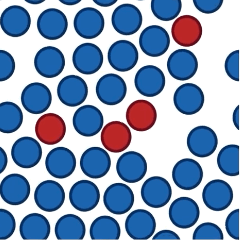Collective phenomena research @CoPhe Lab
(CoPhe pronounced as coffee; short for collective phenomena)
We are interested in the nonlinear interactions and group level dynamics of collective systems (which are made up of several interacting entities/agents). We study a variety of systems that range from droplets in a microchannel to cells that migrate as a group, collective movement exhibited by social animals for survival to human traffic systems where agents are capable of making intelligent decisions. We use a combination of physics & data-driven approaches to study broad questions that surround the mechanics of these finite collectives. For instance, we are interested in the phenomenon of emergence: how group level behaviour emerge from interactions that are local to the agents. We like to work on inverse problems where we want to engineer the collective, i.e. tune the agent-interactions or design the surroundings, to make the collective behave as desired. We are also interested in inference problems where we derive the equations governing the dynamics of the collective from real data or develop frameworks to infer the hidden characteristics of agents from movement data. [Read more →]

Prospective
students
At CoPhe Lab, we bring together students from diverse academic backgrounds—ranging from mechanical engineering and mechatronics to biomedical engineering and physics. Our team includes PhD scholars, master’s students, and undergraduates. Many students from local private colleges, IISERs, and other institutions join us to complete their final-year projects. [Meet our team →]
Our research spans both fundamental and applied domains, with applications in healthcare, traffic engineering, and swarm robotics. [Explore our projects →]
If you are interested in becoming part of our group, please write to me with your resume attached, clearly stating why you would like to join CoPhe Lab and in what capacity. [Join us →]
Featured blog posts










